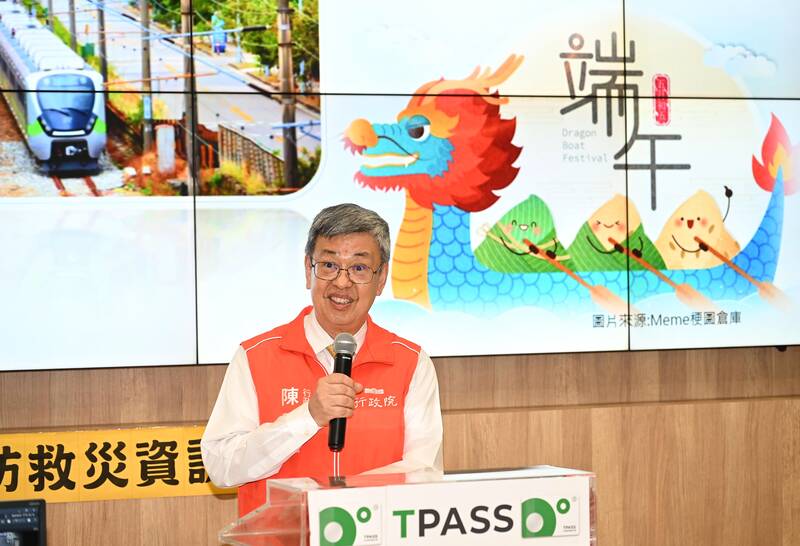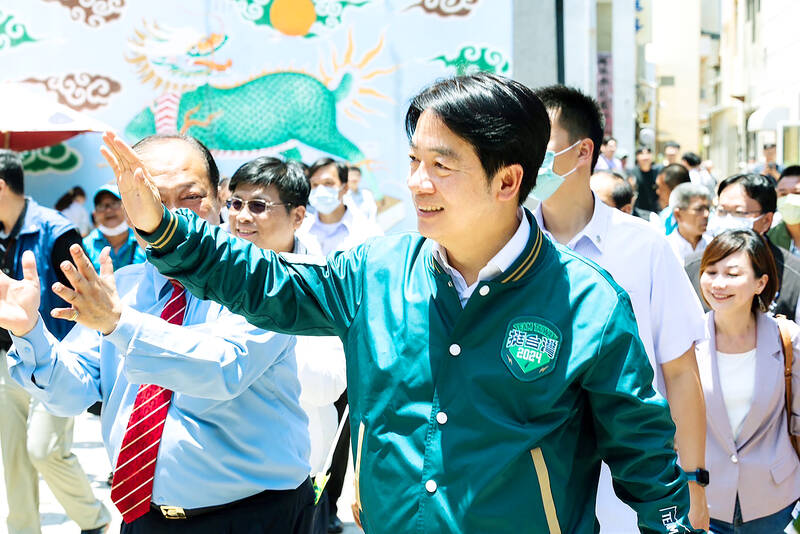Taiwan is to broaden subsidies for college tuition, make high school and vocational high schools free, and extend tuition loans, Premier Chen Chien-jen (陳建仁) said on the sidelines of an event at the Freeway Bureau’s traffic control center in Taipei yesterday.
Chen’s remarks came a day after Vice President William Lai (清德昨), the Democratic Progressive Party’s (DPP) presidential candidate, said that Taiwanese students enrolled in private colleges would receive up to NT$25,000 in tuition subsidies to alleviate their financial burden.
New Taipei City Mayor Hou You-yi (侯友宜), the Chinese Nationalist Party’s (KMT) presidential candidate, yesterday said that the proposed measure was a DPP bid to pander to voters before next year’s presidential and legislative elections.

Photo: Chang Chia-ming, Taipei Times
Chen said that President Tsai Ing-wen’s (蔡英文) administration had carefully examined the issue of education access before deciding to target tuition fees at private colleges.
Tuition costs bar many Taiwanese from pursuing the education they want at private universities and colleges, he said, adding that the subsidies are aimed at leveling the playing field and increasing fairness in education opportunities.
Separately, DPP spokesman Chang Chih-hao (張志豪) told a news conference following a session of the party’s Central Standing Committee that Lai’s latest proposals were a continuation of the vice president’s concern for giving poorer Taiwanese a fair chance to access education.

Photo courtesy of William Lai’s campaign office via CNA
Lai reduced the interest on student loans and extended the grace period for repayments during his time as premier, Chang said.
Taiwanese from low-income households often had no option other than attending expensive private colleges, which is a situation that doubly disadvantaged them, Chang said, citing Lai’s comments at the committee meeting.
The proposed measures would address those issues, Chang added.
Under current regulations, households with an income of less than NT$1.48 million (US$47,865) are exempt from paying high-school and vocational-school tuition fees, while all others must pay tuition of NT$6,240 per semester per child attending such institutions.
Under the revised rules, all households would be exempt from the fees, Chen said, adding that the policy change is expected to benefit 113,000 students.

Seventy percent of middle and elementary schools now conduct English classes entirely in English, the Ministry of Education said, as it encourages schools nationwide to adopt this practice Minister of Education (MOE) Cheng Ying-yao (鄭英耀) is scheduled to present a report on the government’s bilingual education policy to the Legislative Yuan’s Education and Culture Committee today. The report would outline strategies aimed at expanding access to education, reducing regional disparities and improving talent cultivation. Implementation of bilingual education policies has varied across local governments, occasionally drawing public criticism. For example, some schools have required teachers of non-English subjects to pass English proficiency

‘FORM OF PROTEST’: The German Institute Taipei said it was ‘shocked’ to see Nazi symbolism used in connection with political aims as it condemned the incident Sung Chien-liang (宋建樑), who led efforts to recall Democratic Progressive Party (DPP) Legislator Lee Kun-cheng (李坤城), was released on bail of NT$80,000 yesterday amid an outcry over a Nazi armband he wore to questioning the night before. Sung arrived at the New Taipei City District Prosecutors’ Office for questioning in a recall petition forgery case on Tuesday night wearing a red armband bearing a swastika, carrying a copy of Adolf Hitler’s Mein Kampf and giving a Nazi salute. Sung left the building at 1:15am without the armband and apparently covering the book with a coat. This is a serious international scandal and Chinese

TRADE: The premier pledged safeguards on ‘Made in Taiwan’ labeling, anti-dumping measures and stricter export controls to strengthen its position in trade talks Products labeled “made in Taiwan” must be genuinely made in Taiwan, Premier Cho Jung-tai (卓榮泰) said yesterday, vowing to enforce strict safeguards against “origin laundering” and initiate anti-dumping investigations to prevent China dumping its products in Taiwan. Cho made the remarks in a discussion session with representatives from industries in Kaohsiung. In response to the US government’s recent announcement of “reciprocal” tariffs on its trading partners, President William Lai (賴清德) and Cho last week began a series of consultations with industry leaders nationwide to gather feedback and address concerns. Taiwanese and US officials held a videoconference on Friday evening to discuss the

PERSONAL DATA: The implicated KMT members allegedly compiled their petitions by copying names from party lists without the consent of the people concerned Judicial authorities searched six locations yesterday and questioned six people, including one elderly Chinese Nationalist Party (KMT) member and five KMT Youth League associates, about alleged signature forgery and fraud relating to their recall efforts against two Democratic Progressive Party (DPP) legislators. After launching a probe into alleged signature forgery and related fraud in the KMT’s recall effort, prosecutors received a number of complaints, including about one petition that had 1,748 signatures of voters whose family members said they had already passed away, and also voters who said they did not approve the use of their name, Taipei Deputy Chief Prosecutor